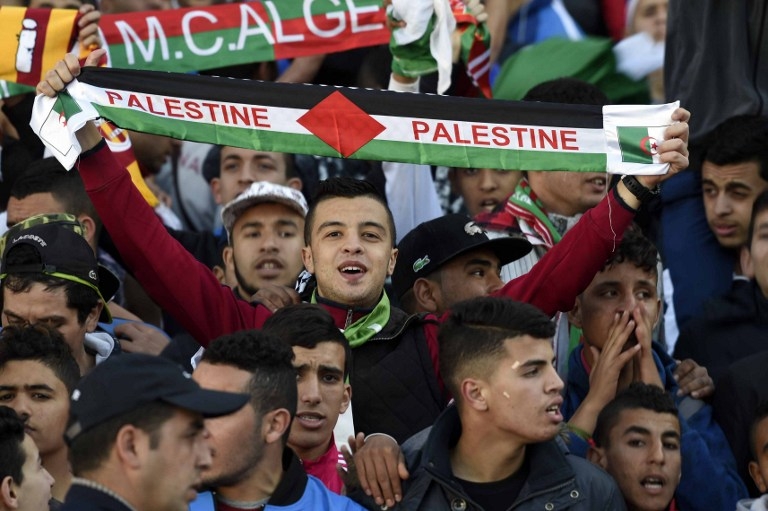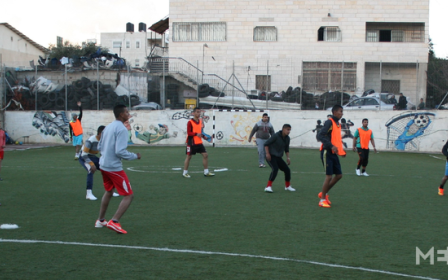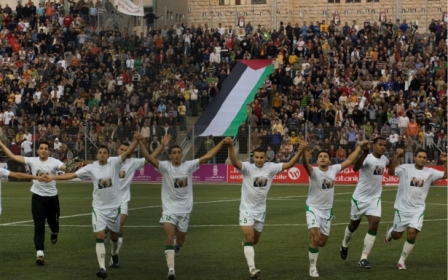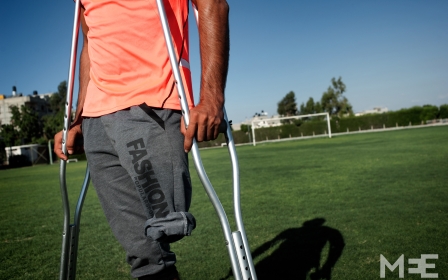Hey Israel, give Palestinians a sporting chance

The troubles of the Middle East have followed the Olympic flame to Rio de Janeiro for the Brazilian games.
An early controversy erupted even before the teams reached the Maracana Stadium.
The Lebanese and Israeli delegations clashed when the organisers planned for the two teams to travel together to the opening ceremony, presumably assuming sport would override politics and that, given the chance to mingle, citizens of the two countries would welcome the opportunity.
The now well-documented incident showed that only a naive organiser would have failed to assume this would be a non-starter.
The Lebanese delegation head refused to let the Israeli team board the coach and the teams travelled separately. It was ironic that the Israeli sailing team coach complained about this act of discrimination when he must know of the discrimination that Israel practices against Palestinians with the building of roads and towns designed and constructed for Jews only.
The Israeli-Palestinian conflict also impacted the start of the games: the six members of the Palestinian team - including 55-year-old dressage rider and German businessman Christian Zimmerman - travelled to the games without their official uniforms and equipment, impounded by Israeli customs.
Before the games began, as Munther Masalmeh, secretary-general of the Palestinian National Olympic Committee told the media, the team's gear had not cleared customs yet.
“We got one shipment several months ago and we have not been able to bring it in,” he said. “We were forced to travel without our equipment and to buy them instead in Brazil.”
In a further act of interference in the Palestinian Olympic delegation, Israel banned Issam Qishta, the head of the Palestinian delegation, from leaving the Gaza Strip to join the Rio-bound team.
"We do our best to let him leave as soon as possible," Emmanuel Nahshon, spokesman for the Israeli foreign ministry, said.
Playing politics
Israeli interference in Palestinian sporting affairs is nothing new. Recently, Israel banned several players from Gaza’s Ittihad Al-Shejaiya football team from crossing into the West Bank through the Erez border to play the final match of the Palestine football cup against Ahli Al-Khalil from Hebron in the West Bank.
The first leg of the cup final, which took place in Gaza, marked the first visit by Ahli Alkhalil to the Strip in 15 years. However, several players on the West Bank team faced difficulties entering Gaza. The first leg ended in a goalless draw.
Under apparent pressure from football's world governing body FIFA, Israel eventually allowed the Gaza players to cross into the West bank for the rearranged second leg which the West Bank team won.
Over the years, FIFA has had to play a key mediation role between the Palestine Football Federation (PFA) and the Israeli Football Federation (IFA). Palestinians believe Israel deliberately hampers their efforts to develop the game, both at club and at a national team level, largely through restrictions of movement within the occupied territories.
Israel also decides which Palestinian players can leave the territories for training or tournaments abroad and which foreign-based Palestinian members of the national team can enter the occupied territories.
Additionally, Israel decides which foreign teams can enter the occupied territories for games or tournaments.
Israel has also targeted individual Palestinian footballers including Gaza-based star Mahmoud Sarsak, who was arrested at the Erez crossing en route to play in a game in the West Bank and was held without charge for three years before embarking on a hunger strike in 2012 to protest his detention. He ended his hunger strike after 90 days in exchange for early release.
Young, aspiring footballers have also been targeted by occupation forces. In January 2014, Jawhar Nasser Jawhar, 19, and Adam Abd al-Raouf Halabiya, 17, were shot by Israeli soldiers as they were walking home from a training session in the Faisal al-Husseini Stadium in al-Ram in the central West Bank.
A month later, the two youngsters learnt that they could never play sport again as a result of their injuries.
Oppression on and off the field
The continued Israeli interference finally led the Palestinian Football Association to table a motion at FIFA’s fifth congress in 2015, asking for Israel’s suspension.
After much huffing and puffing, the PFA chief Jibril Rajoub dropped the motion under pressure from other delegates and with a view to setting up committees to monitor the situation.
“I am here to play football, rather than to play politics. I want to end suffering," he said at the time.
"I decided to drop the suspension, but it does not mean that I give up the resistance. A lot of colleagues who I respect and I appreciate explained to me how it is painful for them to hear in this family about the issue of suspension."
As the situation on the ground continues to deteriorate for Palestinian football, Israel’s meddling with the Olympic team is symptomatic of the wider oppressive policies against the Palestinian people, a case of politics impacting every aspect of Palestinian life.
What does Israel gain from upsetting young atheletes? It chooses to incite young Palestinians to hate their occupier, inciting and reminding Palestinians that they are occupied, on a daily basis, something that cannot be tolerated. The free world should heap pressure on Israel through the Boycott, Divestment and Sanctions (BDS) movement as a result.
Rather than upset Palestinian athletes and engender hatred, Israel can surely gain more from them focusing on training and competing at the highest possible level.
A state which is looking to coexist with the people with whom it shares a land would find no better starting place to develop this than with sports, music and culture.
- Kamel Hawwash is a British-Palestinian engineering professor based at the University of Birmingham and a longstanding campaigner for justice, especially for the Palestinian people. He is vice chair of the Palestine Solidarity Campaign (PSC) and appears regularly in the media as commentator on Middle East issues. He runs a blog at www.kamelhawwash.com. He writes here in a personal capacity.
The views expressed in this article belong to the author and do not necessarily reflect the editorial policy of Middle East Eye.
Photo: Palestine's supporters cheer during a friendly football match between the Palestinian and Algerian Olympic football teams in Algiers on 17 February 2016 (AFP)
Middle East Eye propose une couverture et une analyse indépendantes et incomparables du Moyen-Orient, de l’Afrique du Nord et d’autres régions du monde. Pour en savoir plus sur la reprise de ce contenu et les frais qui s’appliquent, veuillez remplir ce formulaire [en anglais]. Pour en savoir plus sur MEE, cliquez ici [en anglais].





